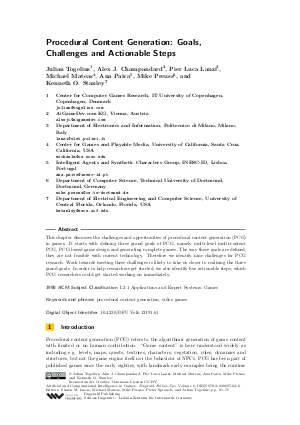Procedural Content Generation: Goals, Challenges and Actionable Steps
Authors Julian Togelius, Alex J. Champandard, Pier Luca Lanzi, Michael Mateas, Ana Paiva, Mike Preuss, Kenneth O. Stanley
-
Part of:
Volume:
Artificial and Computational Intelligence in Games (DFU - Vol. 6)
Part of: Series: Dagstuhl Follow-Ups (DFU) - License:
 Creative Commons Attribution 3.0 Unported license
Creative Commons Attribution 3.0 Unported license
- Publication Date: 2013-11-18
File

PDF
DFU.Vol6.12191.61.pdf
- Filesize: 404 kB
- 15 pages
Document Identifiers
Subject Classification
Keywords
- procedural content generation
- video games
Metrics
- Access Statistics
-
Total Accesses (updated on a weekly basis)
0PDF Downloads0Metadata Views
Abstract
This chapter discusses the challenges and opportunities of procedural content generation (PCG) in games. It starts with defining three grand goals of PCG, namely multi-level multicontent PCG, PCG-based game design and generating complete games. The way these goals are defined, they are not feasible with current technology. Therefore we identify nine challenges for PCG research. Work towards meeting these challenges is likely to take us closer to realising the three grand goals. In order to help researchers get started, we also identify five actionable steps, which PCG researchers could get started working on immediately.
Cite As Get BibTex
Julian Togelius, Alex J. Champandard, Pier Luca Lanzi, Michael Mateas, Ana Paiva, Mike Preuss, and Kenneth O. Stanley. Procedural Content Generation: Goals, Challenges and Actionable Steps. In Artificial and Computational Intelligence in Games. Dagstuhl Follow-Ups, Volume 6, pp. 61-75, Schloss Dagstuhl – Leibniz-Zentrum für Informatik (2013)
https://doi.org/10.4230/DFU.Vol6.12191.61
BibTex
@InCollection{togelius_et_al:DFU.Vol6.12191.61,
author = {Togelius, Julian and Champandard, Alex J. and Lanzi, Pier Luca and Mateas, Michael and Paiva, Ana and Preuss, Mike and Stanley, Kenneth O.},
title = {{Procedural Content Generation: Goals, Challenges and Actionable Steps}},
booktitle = {Artificial and Computational Intelligence in Games},
pages = {61--75},
series = {Dagstuhl Follow-Ups},
ISBN = {978-3-939897-62-0},
ISSN = {1868-8977},
year = {2013},
volume = {6},
editor = {Lucas, Simon M. and Mateas, Michael and Preuss, Mike and Spronck, Pieter and Togelius, Julian},
publisher = {Schloss Dagstuhl -- Leibniz-Zentrum f{\"u}r Informatik},
address = {Dagstuhl, Germany},
URL = {https://drops.dagstuhl.de/entities/document/10.4230/DFU.Vol6.12191.61},
URN = {urn:nbn:de:0030-drops-43367},
doi = {10.4230/DFU.Vol6.12191.61},
annote = {Keywords: procedural content generation, video games}
}
